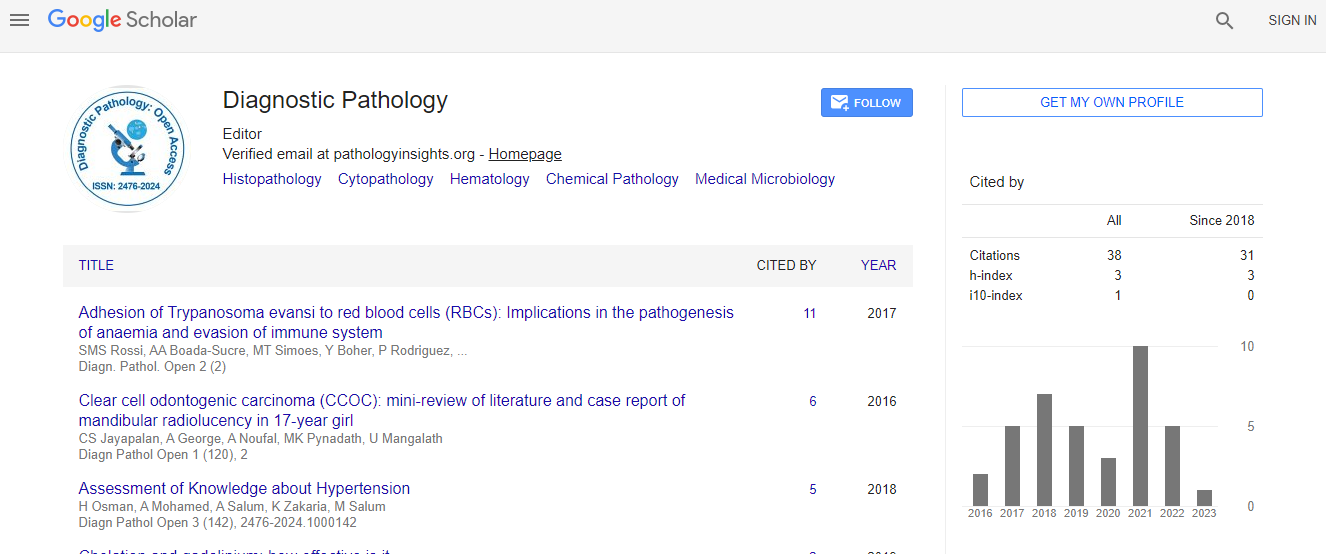Our Group organises 3000+ Global Conferenceseries Events every year across USA, Europe & Asia with support from 1000 more scientific Societies and Publishes 700+ Open Access Journals which contains over 50000 eminent personalities, reputed scientists as editorial board members.
Open Access Journals gaining more Readers and Citations
700 Journals and 15,000,000 Readers Each Journal is getting 25,000+ Readers
Google Scholar citation report
Citations : 110
Diagnostic Pathology: Open Access received 110 citations as per Google Scholar report
Diagnostic Pathology: Open Access peer review process verified at publons
Indexed In
- Google Scholar
- RefSeek
- Hamdard University
- EBSCO A-Z
- Publons
- Euro Pub
- ICMJE
Useful Links
Share This Page
Amy Hong Zhang

Amy Hong Zhang
Associate Professor
Department of Pathology and Translational Molecular Pathology University of Texas MD Anderson Cancer Center
USA
Biography
Dr. Amy Hong Zhang, M.D., Ph. D., is currently an Associate Professor in the Department of Pathology and Translational Molecular Pathology in University of Texas-M.D. Anderson Cancer Center in Houston, TX, specializing on breast cancer pathology. Prior to joining UT-MDACC, Dr. Zhang was an Assistant Professor in the Department of Pathology in the Baylor College of Medicine from 2006 to 2009. Dr. Zhang is an American Board certified practicing pathologist since 2003. Dr. Zhang has expertise in diagnosing breast cancers and the interpretation of the biomarkers relevant to breast cancers for patient care. Dr. Zhang is also actively participating in clinical teaching for the residents/fellows on surgical pathology and supervising research scientists and trainees on translational and laboratory research working on the characterization and development of new molecules significant for breast tumorigenesis.
Research Interest
Dr. Zhang’s research is focused on the study of the mechanisms in breast cancer tumorigenesis and progression. The final goal aims to discover new molecular markers with prognostic/predictive values potentially for clinical use and to identify potential target for the targeted therapy. The interest in the clinical research focuses on the evaluation of differential gene expression of the tumor markers on in situ and invasive ductal carcinoma of breast using the immunohistochemical method and Fluorescence in situ hybridization (FISH) methods on human breast tissue. The laboratory research focuses on characterizing the function of a tyrosine kinase and its related molecules on the tumorigenesis and progression of breast cancer. The integrative methods on genomic expression pattern analysis identify potential important molecules in the breast cancer and the in vitro biochemical and molecular biology study on cell lines and tissue extracts will characterize the functions of the molecules. The in vivo mouse models are also utilized to validate the functional importance and to confirm the in vitro experimental results.

 Spanish
Spanish  Chinese
Chinese  Russian
Russian  German
German  French
French  Japanese
Japanese  Portuguese
Portuguese  Hindi
Hindi 

